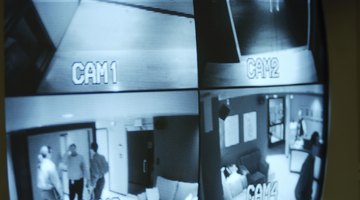Are TSA Scanners Safe for Pregnant Women?
Pregnant women with airplane trips scheduled have many safety concerns. The Transportation Security Administration has security checkpoints at every major airport in the United States, and traditional screening methods involve body scanners. While some physicians have raised concerns about the safety of these scanners, the TSA maintains that their scanners pose no health concerns and are safe for all passengers -- including pregnant women.
Metal Detectors
Screening with a metal detector involves walking through a scanner, which uses low-frequency electromagnetic waves to scan for metal weapons and other threats. Metal detector scanners do not use X-ray technology, so they don't emit radiation. The levels of electromagnetic waves emitted by these machines are so minuscule they are considered safe for everyone. The chances of a metal detector harming you or your unborn child are slim to none. Electromagnetic waves are emitted by many devices you use on a daily basis, including your television, curling iron or anything else that uses electricity.
Backscatter
Can I Go Through the Airport Body Scanner if I'm Pregnant?
Learn More
The backscatter is a scanner that uses advanced imaging technology to provide a TSA officer in a remote location with an outline of passengers' bodies and images of any potential threats that may be hidden under their clothes. The backscatter has been controversial in the past, with some physicians questioning the safety of the radiation emitted by these machines. The TSA, however, states that the amount of radiation a person is exposed to during a backscatter scan is equivalent to the same exposure she would receive riding in an airplane for two minutes. Developed by the Food and Drug Administration, the backscatter has been deemed safe for all passengers, including pregnant women.
Millimeter Wave
The millimeter wave uses the same advanced imaging technology as the metal detector in a handheld device that TSA officers use to scan individual parts of a passenger's body. The agent will simply stand in front of you and wave the scanner around your body while it emits low-frequency electromagnetic waves to check for threats. This scanner has also been deemed safe for pregnant women, as it emits 1,000 times less energy than a single cell phone call.
Alternative to Scanners

How to Tell If Someone Has a Nanny Cam
Learn More
If you still harbor concerns about passing through a TSA scanner while you're pregnant, you can opt out of technological scanning and instead request a full body pat-down as you pass through security. Pat-downs involve no scanners and are instead conducted by a TSA officer by hand. Pat-downs are always performed by an officer of the same gender as the passenger with another TSA employee present. You may feel comfortable having your pat-down conducted in the security checkpoint area, or you can request a private screening out of view of other passengers. If you choose a private screening, you may bring a companion with you. While pat-downs may be uncomfortable, they are noninvasive and pose absolutely no health risks.








